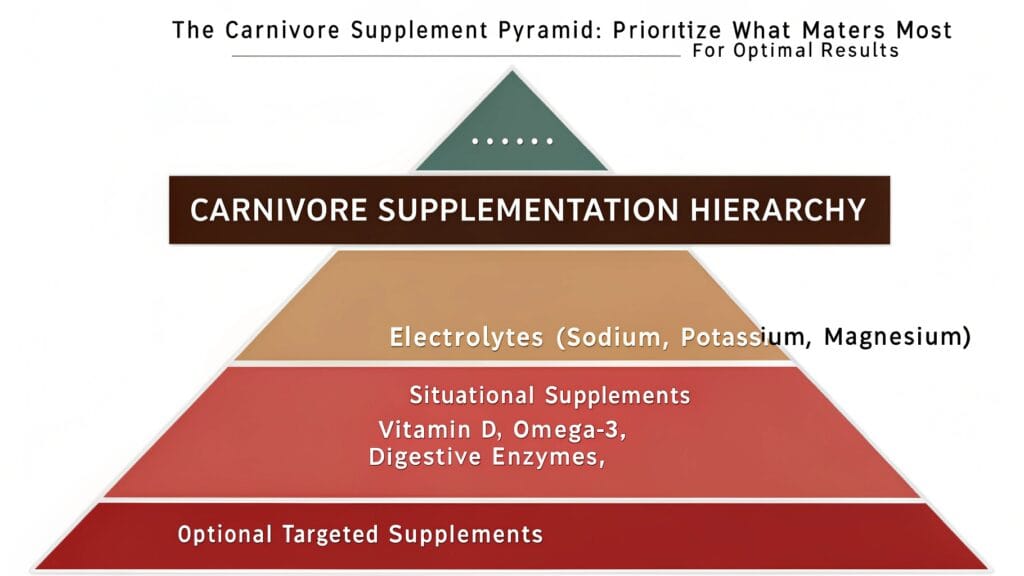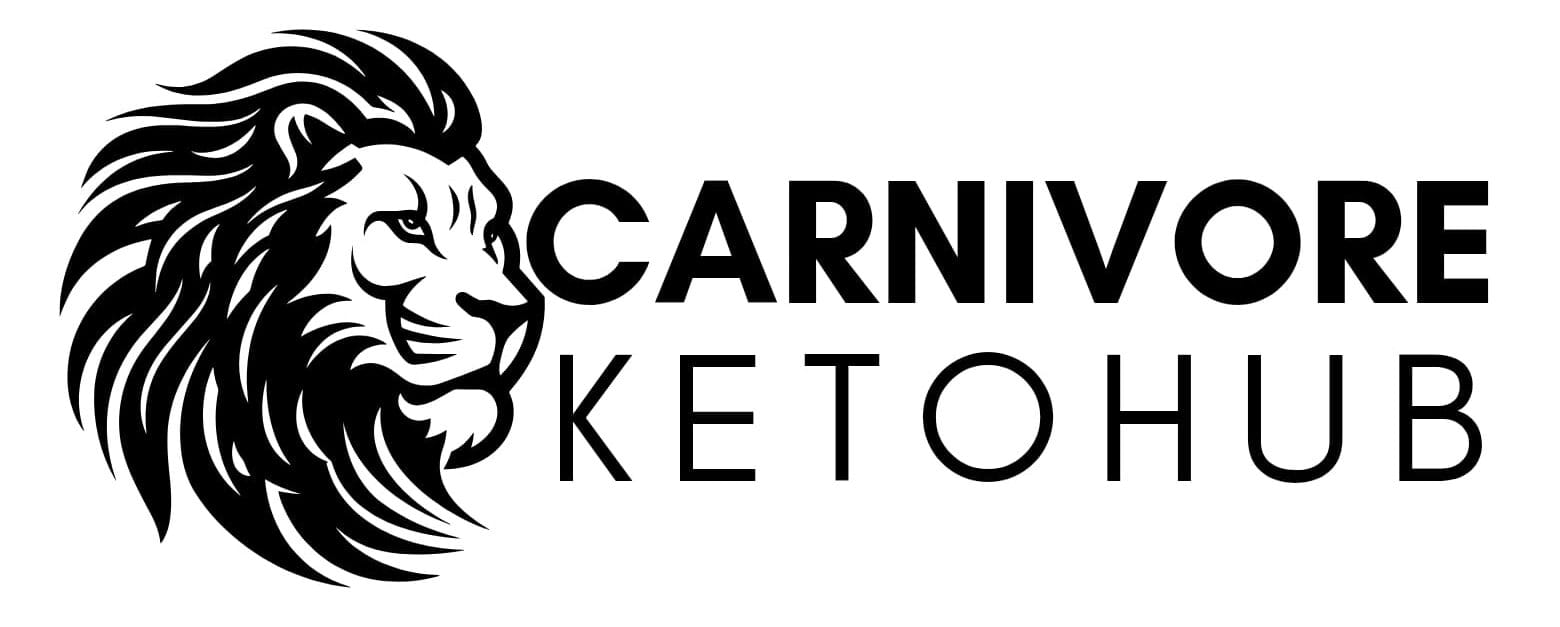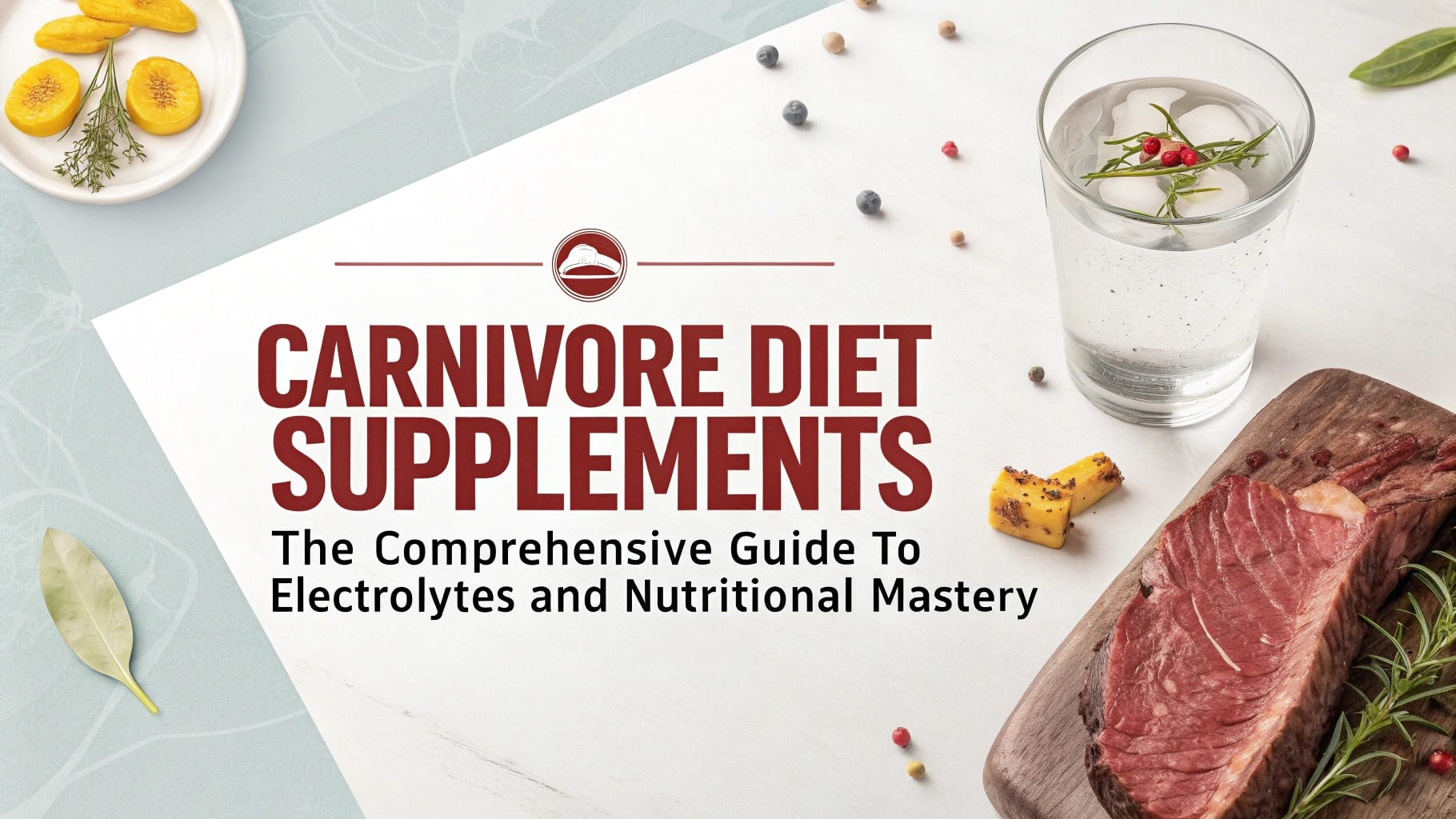Carnivore Diet Supplements: Electrolytes & Key Nutrients for Success
Are you struggling with fatigue, headaches, or muscle cramps on your carnivore journey? The missing link might be proper supplementation – particularly electrolytes. While the carnivore diet boasts incredible nutrient density from animal foods, strategic supplementation can be the difference between thriving and merely surviving during your metabolic adaptation.
In this comprehensive guide, we’ll explore why electrolytes are absolutely crucial for carnivore diet success, which specific supplements deserve consideration, and how to implement an effective supplementation strategy that supports your carnivore lifestyle.
Table of Contents
The Metabolic Shift & Why Electrolytes Are Key
When you transition to a carnivore or keto diet, your body undergoes a profound metabolic transformation. As we explored in our insulin sensitivity article, the carnivore diet leads to significant metabolic changes, including lower insulin levels. This shift from glucose-burning to fat-burning metabolism triggers a cascade of physiological adaptations that directly impact your electrolyte balance.
Here’s what happens: As insulin levels drop (a beneficial effect for metabolic health), your kidneys begin processing sodium differently. Instead of retaining sodium as they do during higher-carb eating, they excrete more sodium and water. While this helps eliminate bloating and excess water weight, it also flushes out essential electrolytes your body needs.
Additionally, by eliminating plant foods, you’re removing traditional sources of minerals like potassium and magnesium found in vegetables and fruits. The combination of increased excretion and decreased intake creates the perfect storm for electrolyte imbalances.
The Dreaded Carnivore Flu
The result? Many carnivore beginners experience what’s commonly called “carnivore flu” or “keto flu” – a collection of unpleasant symptoms that can make you question your dietary choices. These symptoms typically include:
- Persistent fatigue and low energy
- Headaches or migraines
- Muscle cramps and spasms
- Brain fog and difficulty concentrating
- Dizziness or lightheadedness
- Heart palpitations
- Irritability and mood changes
- Sleep disturbances

The good news? These symptoms aren’t a sign that the carnivore diet isn’t working – they’re actually indicators that your metabolism is changing. Even better, they’re almost always preventable or quickly resolvable with proper electrolyte supplementation.
Electrolytes: Your Metabolic Foundation
Electrolytes are electrically charged minerals that conduct electrical impulses throughout your body. They’re absolutely essential for nerve signaling, muscle contraction, fluid balance, and countless biochemical reactions. On a carnivore diet, three electrolytes deserve special attention: sodium, potassium, and magnesium.
Sodium: The Foundational Electrolyte
Sodium may be demonized in conventional nutrition circles, but it’s absolutely critical for carnivore dieters. It plays essential roles in:
- Maintaining fluid balance inside and outside cells
- Supporting proper nerve function
- Enabling muscle contractions
- Facilitating nutrient absorption in the intestines
Why It’s Depleted: As mentioned earlier, lower insulin levels cause increased sodium excretion through the kidneys. Without the sodium retention effect of higher insulin, carnivore dieters need significantly more sodium than the general population.
Carnivore-Friendly Sources:
- Generously salted meats
- Bone broth (homemade bone broth recipe here)
- High-quality salts (Sea Salt, Himalayan Pink Salt, Redmond Real Salt)
Recommended Daily Intake: 5-7g of sodium (approximately 2-3 teaspoons of salt) – notably higher than conventional dietary recommendations due to increased excretion on low-carb diets.
Potassium: The Cellular Regulator
Potassium works in balance with sodium, primarily regulating fluid balance inside your cells. It’s critical for:
- Heart rhythm and cardiovascular function
- Muscle contractions and preventing cramps
- Nerve impulse transmission
- Maintaining cellular electrical gradients
Why It Can Be Tricky: While meat contains potassium, the amounts are more modest compared to some plant foods. Traditional potassium-rich foods like bananas and potatoes are eliminated on carnivore.
Carnivore Sources:
- Muscle meats (beef contains approximately 300-400mg per 100g)
- Organ meats (especially heart)
- Bone broth (try our beef bone broth recipe)
Supplementation Caution: I must emphasize that potassium supplementation requires EXTREME CAUTION and should only be done under MEDICAL SUPERVISION due to potential heart rhythm risks. Focus primarily on getting potassium from food sources. If supplementing, “lite salt” products that contain potassium chloride mixed with sodium chloride (like Nu-Salt) can be used in small amounts.
Magnesium: The Multifaceted Mineral
Magnesium participates in over 300 enzymatic reactions in the body and is particularly important for:
- Muscle relaxation (preventing cramps)
- Nervous system regulation
- Sleep quality
- Stress response
- Energy production at the cellular level
Why It’s Often Deficient: Modern agricultural practices have depleted soil magnesium levels, and carnivore dieters no longer consume plant sources of magnesium. Even in conventional diets, magnesium deficiency is extremely common.
Carnivore Sources:
- Meat contains some magnesium, but typically in smaller amounts
- Mineral water with naturally occurring magnesium
- Small amounts in bone broth
Recommended Supplementation: Magnesium is often the most commonly recommended supplement beyond sodium for carnivore dieters. The best forms include:
- Magnesium Glycinate: The most bioavailable form, gentle on the digestive system
- Magnesium Malate: Well-absorbed and may support energy production
- Typical dosage: 200-400mg elemental magnesium daily
- Optimal timing: Evening, as magnesium can support relaxation and sleep
Practical Electrolyte Implementation
The key to electrolyte success on carnivore is consistency and personalization. Here’s how to implement an effective strategy:
Listen to Your Body
Pay attention to symptoms that may indicate electrolyte imbalances:
- Muscle cramps or twitches (often magnesium/potassium)
- Headaches or brain fog (often sodium)
- Heart palpitations (could be potassium or magnesium)
- Fatigue or weakness (often sodium or general electrolyte imbalance)
Salt First: The Simple Solution
The easiest step is adding more salt to your food. Don’t be shy – carnivore meats can handle substantial salting, and your body likely needs it. If you’re experiencing carnivore flu symptoms, try adding ¼-½ teaspoon of salt to water and drinking it. The relief can be surprisingly quick.
Electrolyte Drinks (DIY or Commercial)
DIY Formula:
- 4 cups filtered water
- ½-1 teaspoon high-quality salt
- Optional: ¼ teaspoon “lite salt” (potassium chloride/sodium chloride mix) – use with caution
- Optional: Magnesium drops (follow product instructions)
Commercial Recommendations: For convenience, several excellent pre-formulated electrolyte supplements are available:
- LMNT Electrolyte Drink Mix: Zero carbs, proper sodium levels, clean ingredients
- Redmond Re-Lyte: Well-balanced electrolyte formula with quality ingredients
- Key Nutrients Electrolyte Recovery Plus: Comprehensive electrolyte blend with additional support
Key Selection Criteria:
- Zero or minimal carbs (less than 1g per serving)
- No added sugar or artificial sweeteners
- Clean ingredient list without fillers
- Adequate sodium content (at least 500mg per serving)
Strategic Supplement Considerations (Beyond Electrolytes)
While electrolytes form the foundation of carnivore supplementation, several other supplements may deserve consideration depending on your specific situation and health goals. Remember, these are optional additions after mastering electrolytes and the foundational diet.

Recommended Occasional Supplements
Omega-3 (EPA/DHA): If you’re not regularly consuming fatty fish like salmon, mackerel, or sardines, you might consider supplementing with high-quality fish oil. Omega-3 fatty acids support:
- Cardiovascular health
- Brain function
- Inflammation management
- Cell membrane integrity
Quality matters tremendously with fish oil. Look for products that verify their purity and potency through third-party testing like the Nordic Naturals Ultimate Omega.
Vitamin D: Unless you get substantial direct sun exposure year-round (without sunscreen), vitamin D supplementation may be beneficial. Vitamin D functions more like a hormone than a vitamin, supporting:
- Immune function
- Bone health
- Hormone regulation
- Mood and mental health
I recommend considering blood testing to determine your vitamin D status before supplementing. A quality option is Thorne Vitamin D/K2 Liquid, which pairs vitamin D with vitamin K2 for optimal calcium metabolism.
Desiccated Organ Supplements: Organ meats are nutritional powerhouses—often called “nature’s multivitamins.” If you’re not regularly consuming fresh organs (many people find them challenging to eat), desiccated organ supplements provide a convenient alternative. They offer concentrated forms of:
- B vitamins (especially B12)
- Iron and other minerals
- Fat-soluble vitamins (A, D, E, K)
- Unique peptides and cofactors
Quality brands include Ancestral Supplements Grass-Fed Beef Organs and Heart & Soil supplements.
Digestive Enzymes (Temporary): Some people experience an adjustment period when transitioning to the high fat and protein content of a carnivore diet. Temporary digestive enzyme support can help:
- Improve protein digestion
- Enhance fat absorption
- Reduce digestive discomfort
Consider Pure Encapsulations Digestive Enzymes Ultra or similar high-quality options for the adaptation period.
Supplements to Categorically Avoid
Several supplements are either unnecessary or potentially counterproductive on a carnivore diet:
Standard Multivitamins: Most contain synthetic forms of vitamins, improper mineral ratios, and numerous fillers. The nutrient-dense nature of carnivore foods provides most micronutrients in their natural, bioavailable forms.
Sugar/Artificial Additives: Avoid supplements containing dextrose, maltodextrin, artificial colors, or flavors—they contradict the carnivore diet’s core principles.
Most Plant-Based Supplements: While there are exceptions for targeted benefits (which we’ll discuss momentarily), most plant extracts aren’t necessary on a carnivore diet and may contain compounds that interfere with digestion.
Fiber Supplements: Contrary to conventional wisdom, fiber supplements are unnecessary on carnivore and may actually worsen digestive symptoms for many people.
While many plant-based supplements aren’t needed on carnivore, some individuals choose to use specific adaptogens like Ashwagandha or Ginseng for targeted benefits related to stress and energy. Learn more about Adaptogens and if they’re right for you.
Conclusion: Mastering Your Nutritional Ecosystem
Success on the carnivore diet involves prioritizing nutrient-dense animal foods as your foundation, with strategic supplementation serving as targeted support—not replacement—for whole foods. Electrolytes remain the cornerstone of effective supplementation, particularly during the adaptation phase or for ongoing optimization.
Remember to listen to your body, focus on quality sources (both food and supplements), and make informed choices based on your individual needs and responses. The goal isn’t merely surviving on a carnivore diet—it’s thriving with optimal metabolic health and well-being.

Your Carnivore Success Action Steps:
- Start with proper electrolyte balance—especially sodium
- Consider magnesium supplementation if you experience muscle cramps, poor sleep, or stress
- Evaluate your needs for additional targeted supplements based on your specific situation
- Consistently monitor how you feel and adjust accordingly
Medical Disclaimer
This article is for informational purposes only and does not constitute medical advice. Always consult with a qualified healthcare provider before beginning any new dietary regimen or supplement protocol, especially if you have existing health conditions or take medications. Electrolyte imbalances can have serious health consequences, and supplementation should be approached with appropriate caution.
What’s your electrolyte strategy on carnivore? Have you found certain supplements particularly helpful? Share your experience in the comments below!
Dive deeper into the carnivore diet with our comprehensive food list
Discover delicious carnivore recipes that make this lifestyle sustainable
Learn how intermittent fasting can enhance your carnivore results
Enjoy, Review – We Value Your Opinion!
There are no reviews yet. Be the first one to write one.

